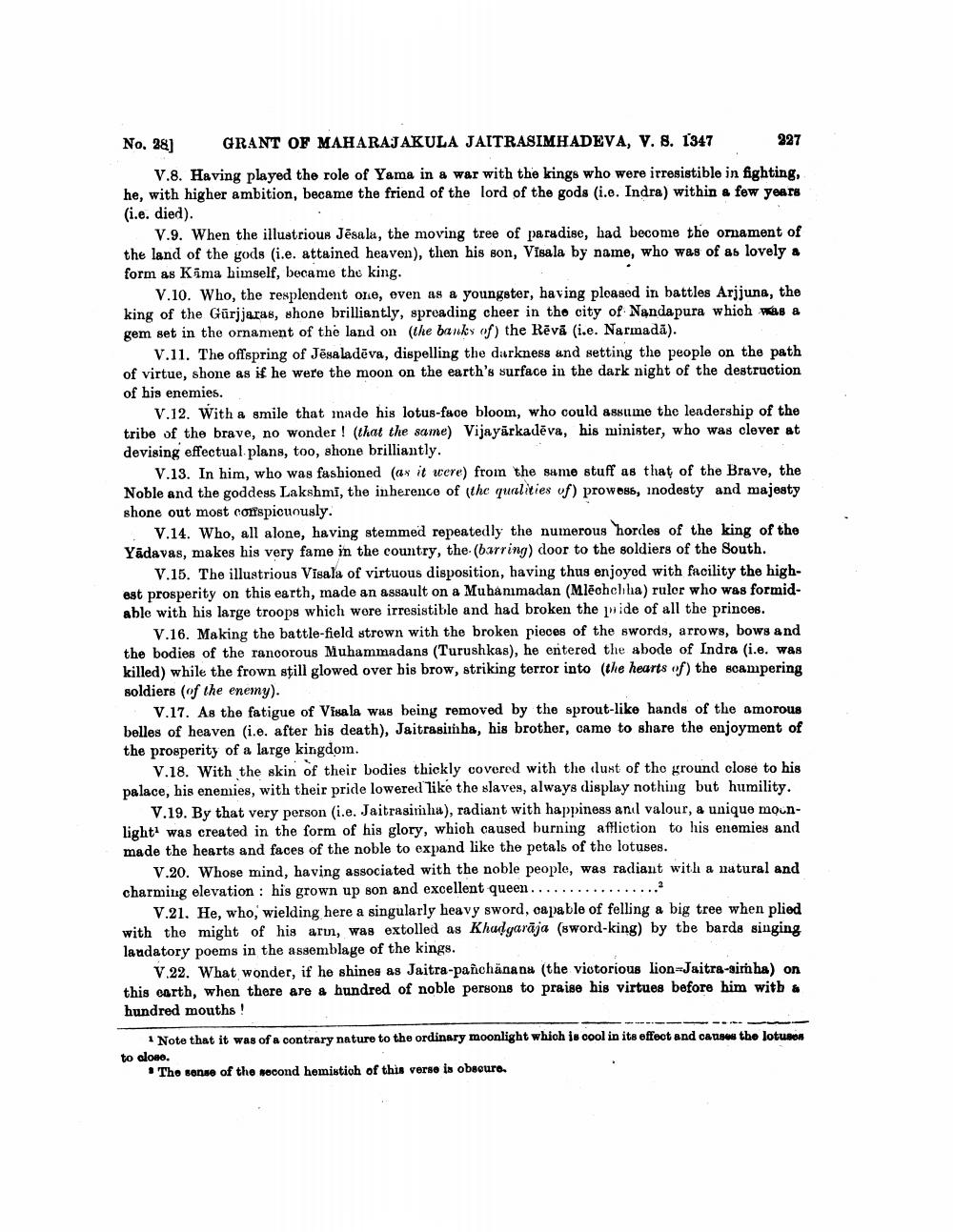________________
No. 28]
GRANT OF MAHARAJAKULA JAITRASIMHADEVA, V. 8. 1347
227
V.8. Having played the role of Yama in & war with the kings who were irresistible in fighting, he, with higher ambition, became the friend of the lord of the gods (i.e. Indra) within a few years (i.e. died).
V.9. When the illustrious Jēsala, the moving tree of paradise, had become the omament of the land of the gods (i.e. attained heaven), then his son, Visala by name, who was of as lovely a form as Kima himself, became the king.
V.10. Who, the resplendent one, even as a youngster, having pleased in battles Arjjuna, the king of the Gūrjjaras, shone brilliantly, spreading cheer in the city of Nandapura which was a gem set in the ornament of the land on the banks of the Rēvă (i.e. Narmadā).
V.11. The offspring of Jēna ladēva, dispelling the darkness and setting the people on the path of virtue, shone as if he were the moon on the earth's surface in the dark night of the destruction of his enemies.
V.12. With a smile that made his lotus-face bloom, who could assume the lendership of the tribe of the brave, no wonder ! (that the same) Vijayārkadēva, his minister, who was clever at devising effectual plans, too, shone brilliantly.
V.13. In him, who was fashioned (as it were) from the same stuff as that of the Brave, the Noble and the goddess Lakshmi, the inherence of the qualities of) prowess, inodesty and majesty shone out most coffspicuously.
V.14. Who, all alone, having stemmed repeatedly the numerous hordes of the king of the Yādavas, makes his very fame in the country, the (barring) door to the soldiers of the South.
V.15. The illustrious Visala of virtuous disposition, having thus enjoyed with facility the highest prosperity on this earth, made an assault on a Muhammadan (Mléchchha) ruler who was formidable with his large troops which wore irresistible and had broken the wide of all the princes.
V.16. Making the battle-field strewn with the broken pieces of the swords, arrows, bows and the bodies of the ranoorous Muhammadans (Turushkas), he entered the abode of Indra (i.e. was killed) while the frown still glowed over bis brow, striking terror into the hearts of the scampering soldiers (of the enemy).
V.17. As the fatigue of Vina la was being removed by the sprout-like hands of the amorous belles of heaven (i.e. after his death), Jaitrasimha, his brother, came to share the enjoyment of the prosperity of a large kingdom.
V.18. With the skin of their bodies thickly covered with the clunt of the ground close to his palace, his enemies, with their pride lowered like the slaves, always display nothing but humility.
V.19. By that very person (i.e. Jaitrasimha), radiant with happiness anıl valour, a unique mounlight was created in the form of his glory, which caused burning affliction to his enemies and made the hearts and faces of the noble to expand like the petals of the lotuses.
V.20. Whose mind, having associated with the noble people, was radiant with a natural and charming elevation : his grown up son and excellent queen...
V.21. He, who, wielding here a singularly heavy sword, capable of felling a big tree when plied with the might of his arun, was extolled as Khadgarāja (sword-king) by the bards singing laudatory poems in the assemblage of the kings.
V.22. What wonder, if he shines as Jaitra-panchanana (the viotorious lion Jaitra-sinha) on this carth, when there are a hundred of noble persons to praise his virtues before him with a hundred mouths !
1 Note that it was of a contrary nature to the ordinary moonlight which is cool in its effect and causes the lotuson to close.
Tho sonno of the necond homistich of this verso is obscuro.




